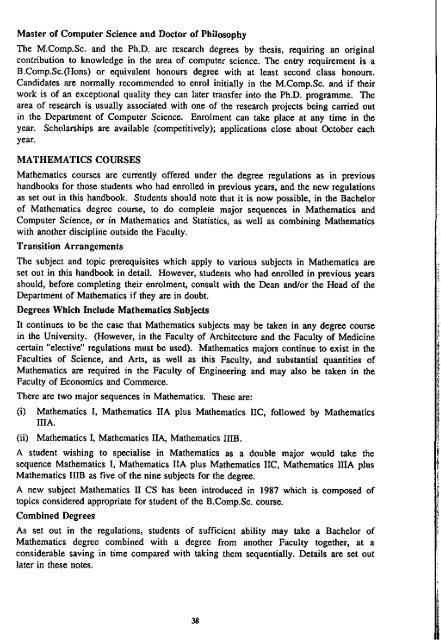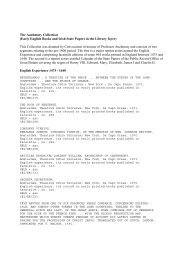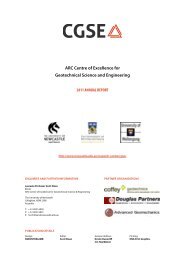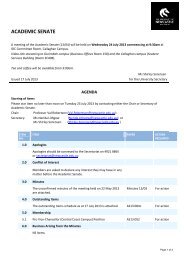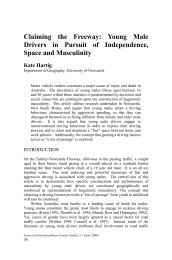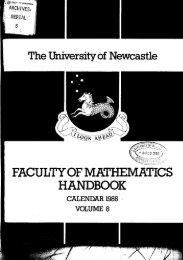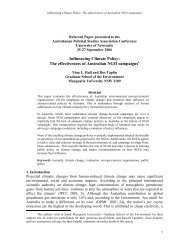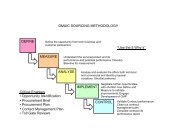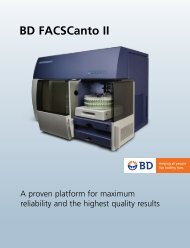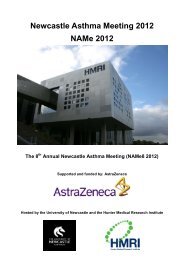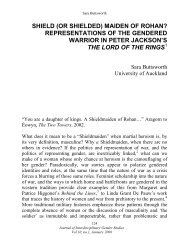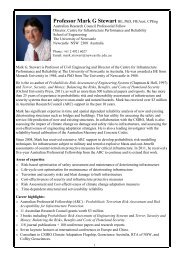Faculty of Mathematic Handbook,1987 - University of Newcastle
Faculty of Mathematic Handbook,1987 - University of Newcastle
Faculty of Mathematic Handbook,1987 - University of Newcastle
You also want an ePaper? Increase the reach of your titles
YUMPU automatically turns print PDFs into web optimized ePapers that Google loves.
Master <strong>of</strong> Computer Science and Doctor <strong>of</strong> Philosophy<br />
The M.Comp.Sc. and the Ph.D. are research degrees by thesis, requtnng an original<br />
contribution to knowledge in the area <strong>of</strong> computer science. The entry requirement is a<br />
B.Comp.Sc.(Hons) or equivalent honours degree with at least second class honours.<br />
Candidates are normally recommended to enrol initially in the M.Comp.Sc. and if their<br />
work is <strong>of</strong> an exceptional quality they can later transfer into the Ph.D. programme. The<br />
area <strong>of</strong> research is usually associated with one <strong>of</strong> the research projects being carried out<br />
in the Department <strong>of</strong> Computer Science. Enrolment can take place at any time in the<br />
year. Scholarships are available (competitively); applications close about October each<br />
year.<br />
MATHEMATICS COURSES<br />
<strong>Mathematic</strong>s courses are currently <strong>of</strong>fered under the degree regulations as in previous<br />
handbooks for those students who had enrolled in previous years, and the new regulations<br />
as set out in this handbook. Students should note that it is now possible, in the Bachelor<br />
<strong>of</strong> <strong>Mathematic</strong>s degree course, to do complete major sequences in <strong>Mathematic</strong>s and<br />
Computer Science, or in <strong>Mathematic</strong>s and Statistics, as well as combining <strong>Mathematic</strong>s<br />
with another discipline outside the <strong>Faculty</strong>.<br />
Transition Arrangements<br />
The subject and topic prerequisites which apply to various subjects in <strong>Mathematic</strong>s are<br />
set out in this handbook in detail. However, students who had enrolled in previous years<br />
should, before completing their enrolment, consult with the Dean andlor the Head <strong>of</strong> the<br />
Department <strong>of</strong> <strong>Mathematic</strong>s if they are in doubt.<br />
Degrees Which Include <strong>Mathematic</strong>s Subjects<br />
It continues to be the case that <strong>Mathematic</strong>s subjects may be taken in any degree course<br />
in the <strong>University</strong>. (However, in the <strong>Faculty</strong> <strong>of</strong> Architecture and the <strong>Faculty</strong> <strong>of</strong> Medicine<br />
certain "elective" regulations must be used). <strong>Mathematic</strong>s majors continue to exist in the<br />
Faculties <strong>of</strong> Science, and Arts, as well as this <strong>Faculty</strong>, and substantial quantities <strong>of</strong><br />
<strong>Mathematic</strong>s are required in the <strong>Faculty</strong> <strong>of</strong> Engineering and may also be taken in the<br />
<strong>Faculty</strong> <strong>of</strong> Economics and Commerce.<br />
There are two major sequences in <strong>Mathematic</strong>s. These are:<br />
(i) <strong>Mathematic</strong>s I, <strong>Mathematic</strong>s IIA plus <strong>Mathematic</strong>s nc, followed by <strong>Mathematic</strong>s<br />
lIlA.<br />
(ii) <strong>Mathematic</strong>s I, <strong>Mathematic</strong>s IIA, <strong>Mathematic</strong>s IIIB.<br />
A student wishing to specialise in <strong>Mathematic</strong>s as a double major would take the<br />
sequence <strong>Mathematic</strong>s I, <strong>Mathematic</strong>s IIA plus <strong>Mathematic</strong>s IIC, <strong>Mathematic</strong>s InA plus<br />
<strong>Mathematic</strong>s 11m as five <strong>of</strong> the nine subjects for the degree.<br />
A new subject <strong>Mathematic</strong>s II CS has been introduced in <strong>1987</strong> which is composed <strong>of</strong><br />
topics considered appropriate for student <strong>of</strong> the B.Comp.Sc. course.<br />
Combined Degrees<br />
As set out in the regulations, students <strong>of</strong> suffiCient ability may take a Bachelor <strong>of</strong><br />
<strong>Mathematic</strong>s degree combined with a degree from another <strong>Faculty</strong> together, at a<br />
considerable saving in time compared with taking them sequentially. Details are set out<br />
later in these notes.<br />
38<br />
Bachelor <strong>of</strong> <strong>Mathematic</strong>s (Honours)<br />
This is a separate degree from the Bachelor <strong>of</strong> <strong>Mathematic</strong>s, and may be taken full-time<br />
over one year or part-time over two years. It consists <strong>of</strong> the single subject <strong>Mathematic</strong>s<br />
IV.<br />
Diploma in <strong>Mathematic</strong>al Studies<br />
This course is intended for graduates who wish to study more <strong>Mathematic</strong>s than was<br />
available in their first degree. The course is sufficiently flexible to meet most graduates'<br />
needs.<br />
Master <strong>of</strong> <strong>Mathematic</strong>s and Doctor <strong>of</strong> Philosophy<br />
These are research degrees by thesis requiring original contribution to knowledge in the<br />
area <strong>of</strong> <strong>Mathematic</strong>s. Entry into either degree would normally require the Honours<br />
degree. Enrolment can take place at any time in the year. Scholarships are available<br />
(competitively); applications close about October each year.<br />
Choice <strong>of</strong> Subjects in the B.Math. Degree<br />
The requirements for the B.Math. degree allow for up to four <strong>of</strong> the nine subjects to be<br />
chosen from the subjects <strong>of</strong>fered in other degree courses. Subjects which have been<br />
approved in the past are listed below.<br />
Accounting I<br />
Biology I<br />
Chemistry I<br />
Part I<br />
Classical Civilisation I<br />
Drama I<br />
Economics IA<br />
English I<br />
French IA or IS<br />
Geography I<br />
Geology I<br />
German IS or IN<br />
Greek I<br />
History I<br />
Japanese I<br />
Latin I<br />
Legal Studies I<br />
Linguistics I<br />
Philosophy I<br />
Physics IA or IB<br />
Psychology I<br />
Sanskrit I<br />
Sociology I<br />
Part II<br />
Biology IIA, lIB & IlIA<br />
Chemistry IIA<br />
Classical Civilisation IIA<br />
Economics IIA & 1m<br />
Education II<br />
Electronics & Instrumentation II<br />
English IIA<br />
French IIA, lIS & lIB<br />
Geography ITA. 1m & IIIB<br />
Geology lIA & ITB<br />
German IIA, lIS & 1m<br />
History IIA, lIB & IIC<br />
Japanese IIA<br />
Legal Studies IIA<br />
Philosophy ITA & ITS<br />
Physics II<br />
Psychology IIA & 1m<br />
Enrolment in the following subjects is restricted as indicated below.<br />
Economics llA - Students should also include the Part II Statistics Topic PS, Probability<br />
and Statistics, in their course.<br />
Economics liB - This subject would not normally be included in the Bachelor <strong>of</strong><br />
<strong>Mathematic</strong>s course. However if permission is given to include this subject then the<br />
content should be discussed with the Dean.<br />
A student may not include both Physics IA and Physics m in his course.<br />
Pennission will normally be given for the inclusion in a student's course <strong>of</strong> subjects<br />
which are prerequisites or corequisites <strong>of</strong> subjects appearing in the schedules.<br />
"


